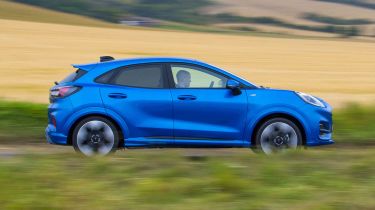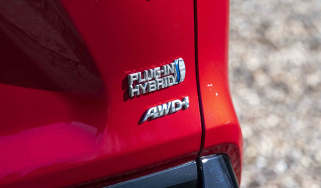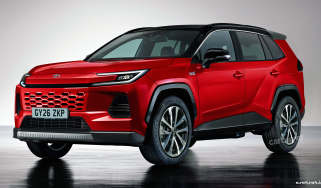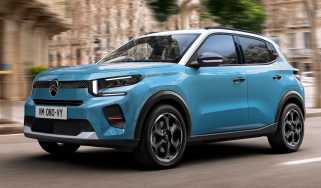What is a mild hybrid? MHEVs vs other hybrids explained
Mild hybrids offer the least electric assistance out of the three types of hybrid – here’s what you need to know

Mild hybrid cars have been steadily growing in popularity over the past few years, to the point where many manufacturers offer at least one today. There are lots of good reasons to pick a mild hybrid car, but it’s important to understand how they work and how they differ from other types of hybrid.
There are three main types of hybrid car available today: mild hybrids, self-charging hybrids and plug-in hybrids. All use a combination of petrol or diesel engine with one or more electric motors to help reduce fuel consumption, lower emissions or, in some cases, improve performance. Out of the three systems, mild hybrids use the smallest battery and electric motor combination, which together provide the lowest level of assistance to the combustion engine.
In this article, we’ll cover all there is to know about mild hybrids, explaining what they are, how they work, and why they might be the right choice for you. We’ll also compare them to other popular hybrid technologies, including self-charging hybrids and plug-in hybrids, and highlight the benefits of choosing a mild hybrid for your next car.
What does mild hybrid mean?
Let’s get the nomenclature out of the way first. All hybrids combine a combustion engine with some sort of electric assistance, using a battery and one or more electric motors. As the name suggests, the electric assistance is only minor in a ‘mild’ hybrid, with the petrol or diesel engine still doing the majority of the work.
The battery and electric motor are there to alleviate some of the strain of the combustion engine. They’re not powerful enough to move the car under electric power alone for any considerable distance, although they can still be used for low-speed manoeuvring in some circumstances.
Instead, the electric motor provides a little extra shove when taking off from a standstill or when accelerating, while the combustion engine runs most of the time and provides the majority of power needed to move the car. Mild hybrid systems can also work alongside start-stop technology to make setting off smoother.
To make things a bit more confusing, some manufacturers refer to mild hybrids as ‘48-volt hybrids’. A 48-volt hybrid system is classed as a mild hybrid system, so be sure not to confuse it with a self-charging hybrid system – these are much more powerful.
What are the benefits of a mild hybrid system?
The key benefit to a mild hybrid system is improved fuel efficiency compared to a traditional petrol or diesel car. Even though the electrical assistance is fairly weak, it can result in a reduction in fuel consumption over time.

For example, the Ford Puma uses a 1.0-litre mild hybrid petrol engine that can return up to around 52mpg. The older model used the same engine without the mild hybrid system and only achieved around 48mpg. A small difference, granted, but one that could add up over time.
Another benefit of mild hybrid cars is that the average person would not notice a significant difference from behind the wheel compared to regular petrol or diesel cars, so you won’t have to adapt your driving style. This contrasts self-charging hybrids and plug-in hybrids, both of which can drive using pure electric power. Some drivers may find this takes a while to get used to.
Not every mild-hybrid system is focused on fuel efficiency, though. Ferrari’s previous flagship hypercar, the LaFerrari, used its mild-hybrid system to boost the engine’s prodigious power, as part of an electrical network that supports a number of the car's auxiliary systems. It’s an innovation that was adapted from the company’s Formula 1 cars.
There have been tax benefits to mild hybrids, too. Until April 2025, mild hybrids were taxed under the same bracket as other hybrids, so were eligible for a £10 annual VED discount. However, this is no longer the case from April 2025.
What cars have a mild hybrid system?
Mild hybrids have grown in popularity in recent times, and the technology can now be found in a wide range of vehicles, including humble city cars like the petrol-powered Fiat 500, up to larger SUVs such as the Kia Sportage or Hyundai Tucson.

Different mild hybrid setups work in different ways. One example, Suzuki’s SHVS (Smart Hybrid Vehicle by Suzuki) system, available in the Suzuki Swift and Suzuki Ignis models, incorporates a 'starter generator' and a relatively small 0.37kWh battery pack. The generator's built-in motor can be called on to assist the engine during hard acceleration, as well as allowing the car's stop-start system to bring the engine back to life more smoothly, thanks to a belt-drive system.
At the other end of the scale, all versions of the latest Audi A8 and Audi A7 Sportback feature a mild-hybrid setup, although its operating effect is more far-reaching than that of Suzuki's system. Audi’s technology enables the car's engine to be turned off for up to 40 seconds when coasting, automatically restarting when acceleration is called for. This is said to offer greater fuel-economy savings than the conventional stop-start of previous models.
Can mild hybrids drive on electric power?
The general answer is no. If you’re looking for a hybrid car that can transition from combustion power to pure electricity once you reach a town centre, then you’ll have to look at pricier self-charging or plug-in hybrids.
However, some modern mild hybrids do offer limited electric-only driving. The latest mild hybrids manufactured by Stellantis brands, including Peugeot and Jeep, can be driven using just the electric motor for limited ranges and up to a certain speed. For example, the Jeep Avenger eHybrid can use its 28bhp electric motor to drive for up to 0.6 miles and up to 18mph, after which the petrol engine kicks in. This can save quite a bit of fuel in heavy stop-and-start traffic
Mild hybrids vs self-charging hybrids and plug-in hybrids
The main difference between mild hybrids and self-charging hybrids and plug-in hybrids is the level of electrical assistance. Mild hybrids offer the least electrical assistance, and therefore cannot be driven on electric power alone in most circumstances. Other hybrids can make use of their bigger batteries and electric motors to drive on pure-electric power for short journeys. Therefore, mild hybrids tend to use more fuel and are usually the least economical of the trio.
Although few would call range-topping Audis and the LaFerrari affordable, a mild-hybrid setup is cheaper to manufacture than a full hybrid system. It’s also lighter, as a mild hybrid’s batteries are smaller. Mild hybrids also tend to recharge their batteries from regenerative braking – something some, but not all, conventional hybrids can do – making a mild hybrid setup more efficient. Of course, there’s also no need to plug in a mild hybrid car to charge it.
There are downsides, though: because mild-hybrid cars aren’t able to run on electric power alone, they tend to have higher CO2 emissions than conventional hybrids and are therefore less attractive for company-car users. Those after the ability to cruise through town on electric power alone must also look elsewhere.
Frequently Asked Questions
‘Mild hybrid’ cars use a small battery and electric motor to provide a small amount of electric assistance to a combustion engine. The level of electrical assistance is less than other types of hybrid and they usually can’t be driven on electric power alone.
Looking to cut your fuel bill? Read our list of the most economical cars on sale…
Recommended

Petrol and diesel car ban relaxed with hybrids permitted beyond 2030

Sharper design and tech for Renault Austral hybrid SUV

New Toyota RAV4 to double down on hybrid power and rugged styling
Most Popular
Tips & advice

Car dashboard warning lights: what does each symbol mean?

Electric car charging stations: public networks, charger types, apps and maps







